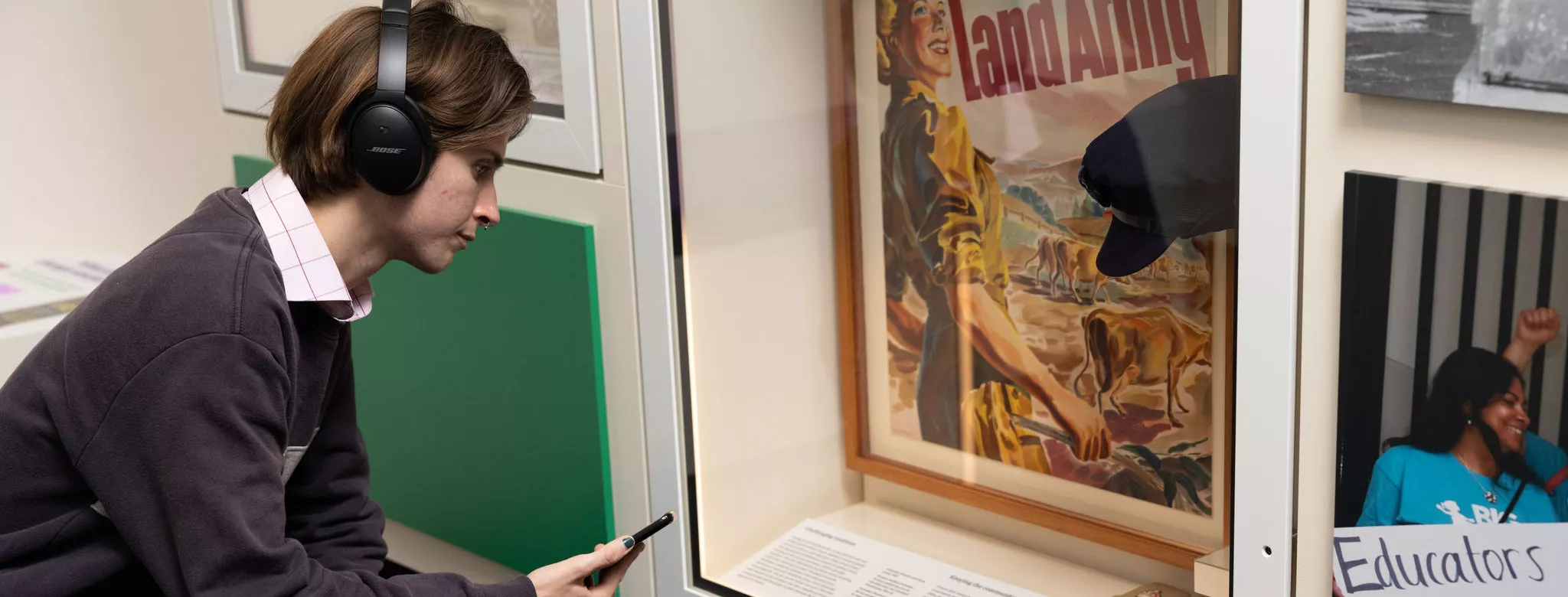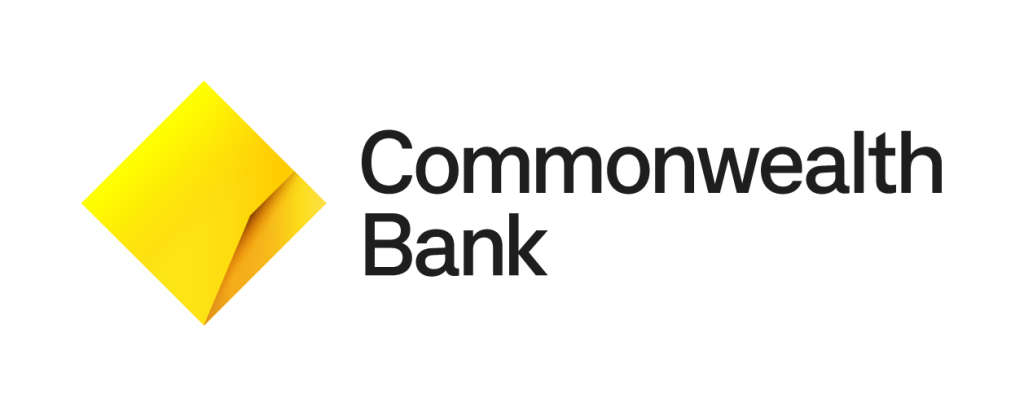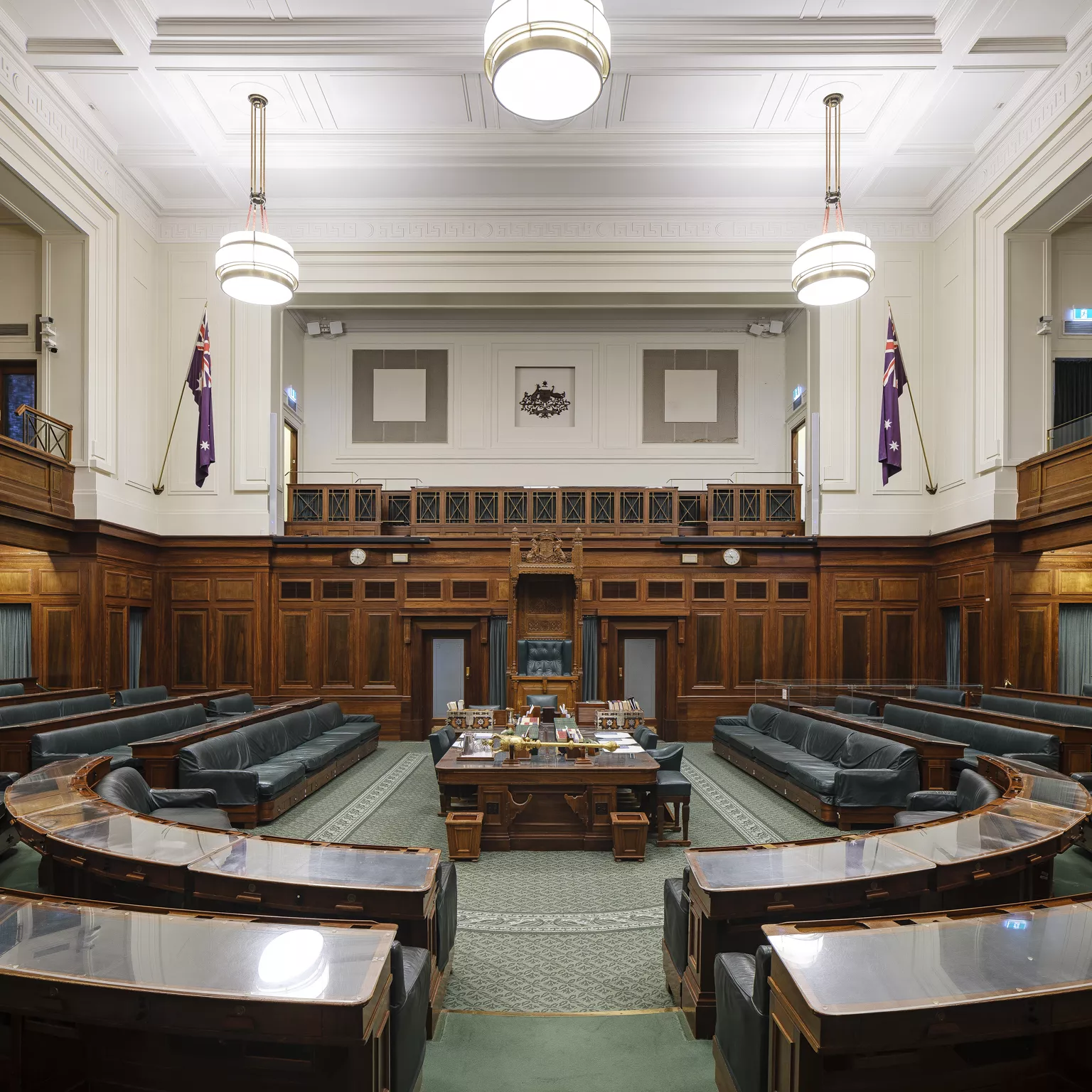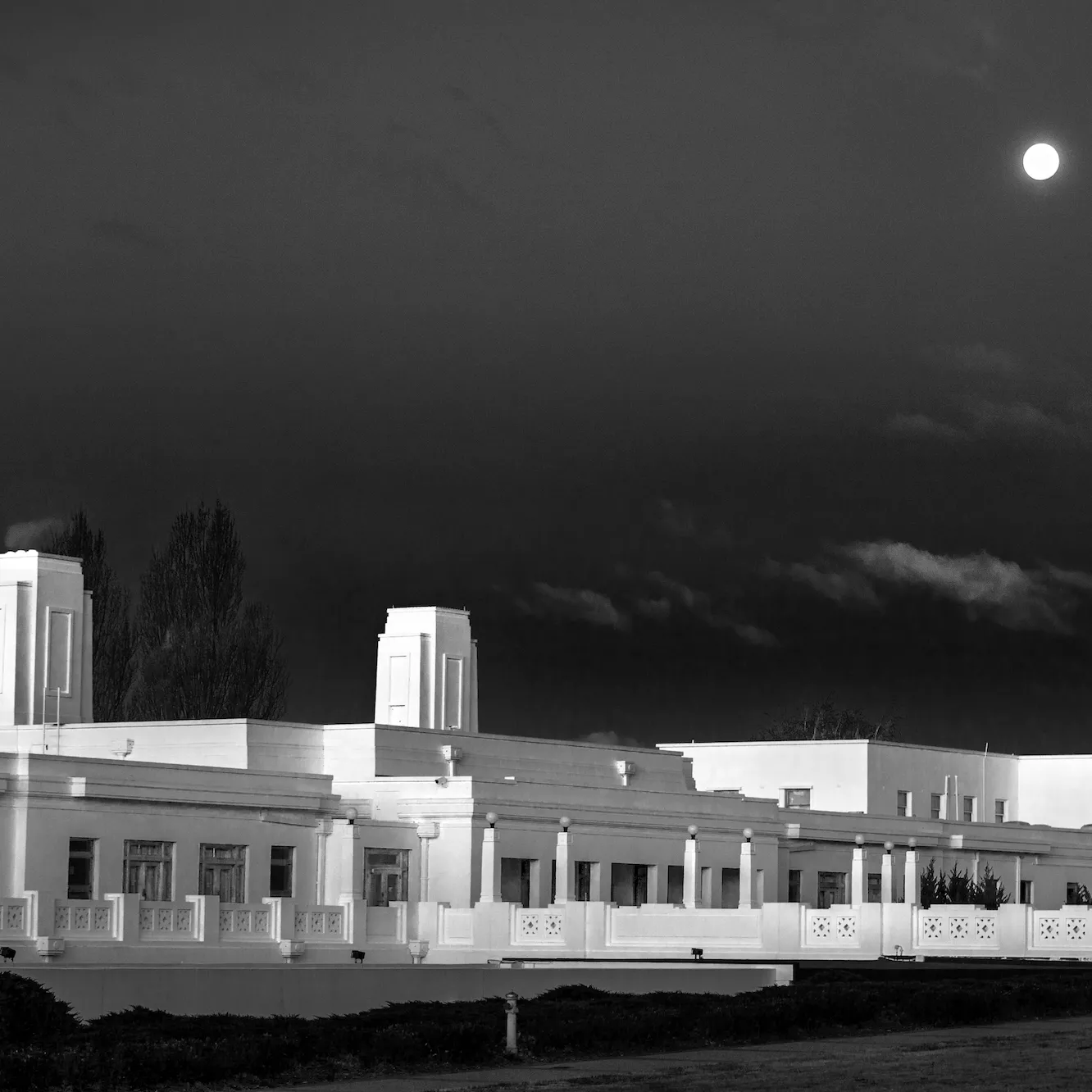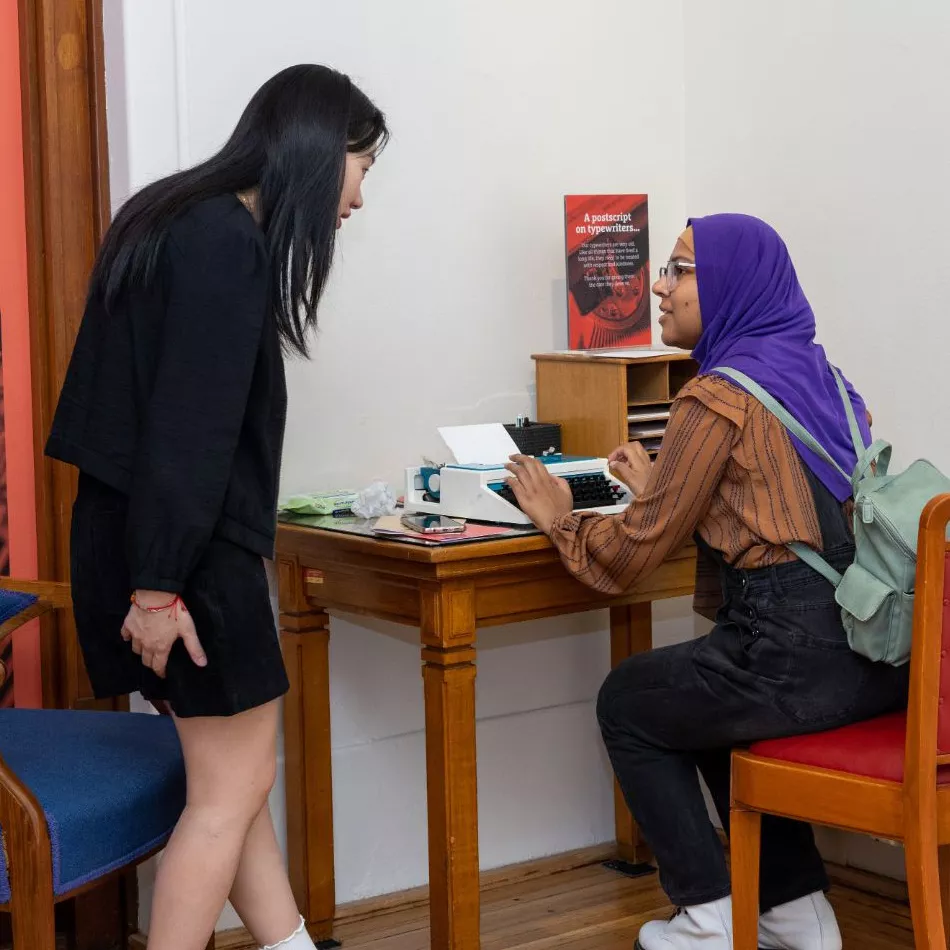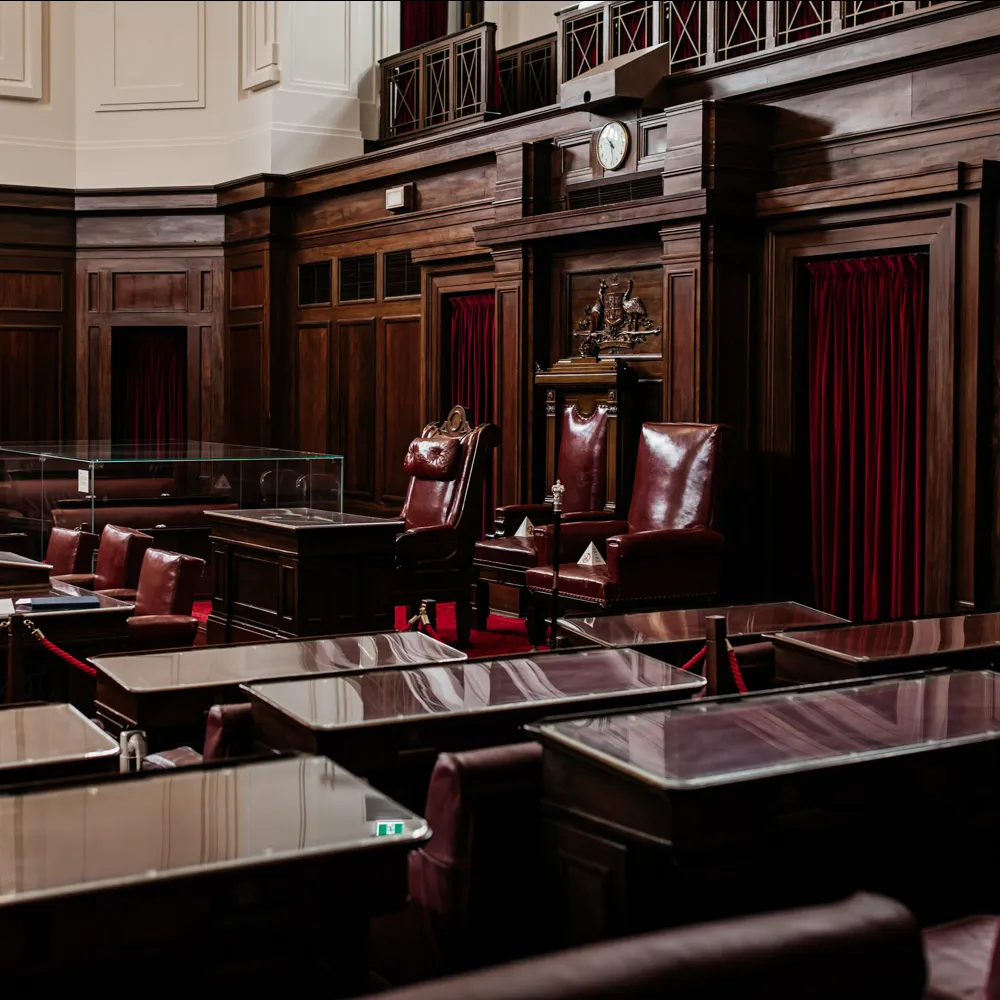I don't personally see myself as a change maker.
She ran past me on the stairs and I kind of tried to stop her and she goes ‘Outta my way, I'm changing the world’.
It’s so, I think, empowering to know that you are not alone.
Kait James
My name is Kait James. I'm a visual artist and proud Wadawurrung woman. For the Changemakers exhibition I made the Always Was, Always Will Be banner, as well as Because of Her, We Can.
So I use autobiographical references, pop culture references from the, from the eighties or when I was growing up, and you know, song lyrics, all sorts of things. Because of Her, We Can is the work that I made about Queen Mary of Ballarat, who I call Queenie.
I've got a really strong family line of women and, sort of, all the way back to her and yeah, I wanted to kind of celebrate her as, you know, she had one child at age 13, didn't have any more children and that one person has, was the last Wadawurrung man. And then he's had numerous children and grandchildren, great-grandchildren and now there’s, you know, hundreds and hundreds of us that are super strong and very involved as well with the Indigenous community and culture.
So it's a picture of her and, with a kind of little label on it saying ‘’Queenie’. Her real name was Catobeen. Yeah, Queenie's a bit of a hero, I think, of mine. I often think about what she had experienced in a short life. But yeah, I’m just very thankful for what, what she did to survive.
Sara Saleh
I think about my roles and responsibilities as someone who is a daughter of migrants and exists on stolen land and has, and embodies all these intersections. And so my manuscript and the poems are very deliberately a series of conversations and meditations between the women in my family.
My name is Sara Saleh. I am a poet, a writer, a human rights campaigner, and I'm also the daughter of migrants who hail from Palestine, Egypt, and Lebanon. And I'm currently based on Gadigal land.
In my family, we understand that the kitchen for example, is seen as, or is perceived traditionally in our culture I’ll say, the place of the woman. I think what’s often missing from the conversation is how that is actually used to subvert and how that's used to empower women in many ways. I mean, just think about the daily conversations that women have around the kitchen table. These relationships, these connections, the stories that they're sharing and telling, the advice that they give which can range from something as simple as exchanging a recipe to something as powerful as, and again empowering, as sex and or issues of domestic and family violence.
We are constantly scrutinised in every way and obviously not only objectified as sex symbols but in our case as a, specifically as a visible Muslim woman, constantly subject to narratives of like being a victim and needing saving and being, you know, like invisible. And I honestly think that if they just once tapped into, you know, one of these conversations, they would see how fierce and funny and just like unapologetic these women are of all backgrounds. Even if we sat in silence, it is a space that holds us together and holds all the parts of us and, all the parts of ourselves, rather. And I think that's the most important thing. I think again, empowering to know that you are not alone.
Amy Claire Mills
I'm Amy. I'm a textile, installation and performance artist. I live and work on Gadigal Wangal land. My pronouns are she/her and I'm disabled. So the art I make, I like to think of it as like sickly sweet. Like it draws you in with the colour and the glitter and the textures, and then it kind of slaps you over the face with the message underneath.
I made some shirts that say ‘Disabled Bitch’ or ‘Chronic Bitch’. And I love when people wear them and you know, people in the community give us filthy looks for them. It really makes my heart so happy because it kinda just like, comments on like, what word are you like, do you have a problem with? Is it, do you have a problem with ‘disabled’ or do you have a problem with ‘bitch’? Are you ableist or are you misogynist like, or are you both? And I love, you know, so many people have told me that they wear the shirts and they wear them proudly and they don't care about the looks and they love the looks, coz it just. It makes people think, it deconstructs their kind of worldview, like, ‘Oh my gosh, this person is literally wearing a shirt that says disabled on it and they look happy and they're proud’.
And that for me is such a win. I like wearing the shirt and I like shocking people. And that's what my art is about. [Text Wrapping Break]I feel like at the end of my life, I can be like, yeah, I did some shit. But until then I think I'm an active participant, ally, feminist in my community. I just try. I try and I try again and I'll keep trying to, yeah.
Deyi Wu
I'm Deyi Wu, President of the New South Wales Young Liberals, part-time law student, and a proud second generation Chinese Australian.
They've never really seen a Young Liberal female president before and being able to challenge their thinking of what a Young Liberal looks like or what a Young Liberal president looks like. It doesn't look like me.
There was one incident when the Member of Parliament, a male Member of Parliament, came up and shook all the guys' hands except for mine. And I remember thinking’ you just wait, coz I'm gonna be somebody and you are gonna have to shake my hand in the future’.
A lot of people ask, as a young female Australian from a migrant background, why I'm in the Young Liberals and why I'm in the Liberal Party. I think there needs to be change internally within our party. And I thought, oh, I'll join, you know, the political party for a social reason and just to meet like-minded people to talk politics. Got inside and I met the people within the Party, within the Young Liberals. And I thought to myself that ‘Is this it, like, these are people running our country and our state and our movement? If you can do it, I'm sure I can do it better’.
I would say to young women who are thinking of getting politically involved, no matter where you sit on the political spectrum just take the plunge and get involved. The best thing that you can do is to keep pushing that dial to ensure women have a seat at the table everywhere.
Matthew Hubner
One moment, which remains really salient to me, I was on a main road on a night out and at this time we'd just come out of a restaurant, a group of guys, and there was a lone girl walking home, down the main road across the street. And one of the guys in the group I was with, there would've been about 12 or 15 of us, wolf-whistled at her. I remember so vividly seeing the discomfort that it caused this girl, this young woman, and her reaction to it, both kind of physical and emotional as well at the time. And she like turned away, but kind of kept her eye on it, picked up her pace and started making her way home, visibly uncomfortable about the situation.
And I just remember thinking what gives someone the right to put someone else in that position? This type of incident might not be perceived as major as some of the things that have occurred. What it is so representative of, is just the pervasiveness of this culture.
My name's Matthew Hubner. I've been involved in the Teach Us Consent movement since its inception. It came off the back of a petition that was launched by Chanel Contos back in February, 2021. And what Chanel did with Teach Us Consent is she really started to identify that sexual assault sits on more of a spectrum.
There's been a couple of, a couple of moments in the campaign which I'll never forget for sure. The first one was actually when Chanel had posted the Instagram post and then was creating what was the initial petition. I think it had had 30 or 40 responses and she ran past me on the stairs and I kind of tried to stop her and she goes ‘Outta my way, I'm changing the world’. And I just, like that moment, it even gives me goosebumps thinking about it now because I like, and I've said it to her so many times I was like, ‘You were right’.
Chiara Grassia
I’m Chiara Grassia, I’m the Founder and Co-director of Girls Rock Canberra.
Girls Rock Canberra is an arts organisation that works to create safe spaces for young people of marginalised gender identities to participate in music and to create together through music.
The structure of Rock Camp is pretty simple. We sort of fling these young people into bands together, and they might not have ever picked up an instrument before, or have met any of these people before, but it's a, you know, it's a really nice, like safe space for them to, for young people to express themselves and through music. You just write a song, which sounds simple but complex at the same time. And then that's it. But there's so much more that goes into the, the week. It's sort of, you know, a week of being vulnerable, but with that sort of vulnerability of like, you know, learning something for the first time or collaborating with people for the first time. It's also, you're building sort of resilience and learning through failure and stuff like nice life skills, really.
There's something quite magical about like, watching the campers sort of shift over the week. You can like visually see it in their confidence, which is really interesting. A former camper who said that Camp was the first time that they sort of met another non-binary adult and they could actually see a future for themselves.
I always get a confidence boost after Camp is finished. It really just feels like being in another world and, you know, a future that you wanna be in.
Zoya Patel
The most interesting thing in reading about feminism when you also have a culturally diverse background is the way that you engage with gender is quite different.
I'm Zoya Patel. I'm a feminist writer and editor, and I write a lot about gender equality, race and identity.
So I read this feminist magazine called Lip when I was fourteen, and it's an Australian magazine, and I read this quiz that was like ‘What kind of feminist are you?’ And it had never occurred to me that being a feminist was something that I could identify with. I immediately saw this intersection with race and gender and I don’t think that that was ever a conscious realisation on my part, it’s just inherent. You kind of can’t take one away from the other when you are a culturally diverse woman growing up in the world.
When I was a teenager, all the fiction that I wrote was very much like different fantasy novels, different fantasy ideas, and that world building was so exciting to me. But I did do this interesting thing where whenever I wrote fiction, I felt like all my main characters had to be white because I thought that's what books were; they were about white people. So I'd have all my main characters as white characters. And then I'd have like this one character off to the side who was culturally diverse. I think that was me just trying to insert a little bit of representation into the content that I was writing, because I wished so much that I could read that kind of content. But I wasn't brave enough then to actually make the main character or the focal point of the work, someone who wasn't white.
Georgie Stone
My name is Georgie Stone. I'm an actor and an activist and a proud trans woman from Melbourne.
Growing up, I felt very isolated because I was trans and I felt like I would have to protect myself by hiding who I was for the rest of my life. But I had to go to court to access the medical treatment that would help me affirm my gender and be who I am. I didn't have a choice.
So it was that lack of power and that lack of agency that really drove me to the advocacy that I ended up doing with my mum, and that knowledge that there were so many other young people like me in that position in Australia.
It's really changed me seeing how many people, how many allies we've been able to bring along with us by telling our story so openly. And that was something that I didn't expect would happen and it has completely changed how I see the future for myself and how I relate to other people.
I don't personally see myself as a ‘changemaker’. I know that the work that my mum and I have done together has helped create change, but we were two of many people who were, who were, um, fighting for law reform. But I like to think that the work that we have done has created change.


